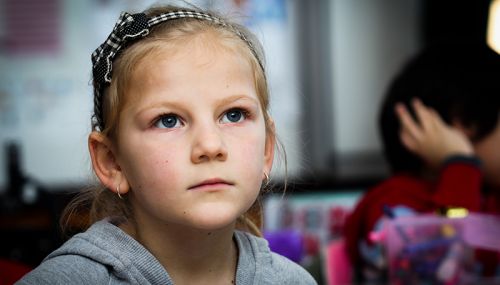- Our studies
- Our research
- Publications and resources
- Data access and training
- About
- News
- Events
- Get in touch
- Join our mailing list

Up to 1 in 5 children in the poorest fifth of families display symptoms of mental illness, compared to 1 in 20 children from the richest homes. But according to a new study, mothers’ mental health matters even more.
Researchers at the Centre for Longitudinal Studies, the Institute for Fiscal Studies and the RAND Corporation analysed information from more than 11,000 children born across the UK in 2000-01, who are being followed by the Millennium Cohort Study. They examined how a wide range of factors affected the children’s chances of developing mental health problems during their pre- and primary school years.
By age 11, around 1 in 10 children showed signs of serious social, emotional and behavioural problems symptomatic of mental illness, including hyperactivity, emotional issues, acting out, or trouble getting along with other children.
Living in poverty raised children’s chances of developing poor mental health. Among pre-school children, it was those who were persistently poor from birth to age 5 who were at greatest risk of developing mental health problems – about 3 percentage points higher than children who were never poor, once other factors affecting their mental health were taken into account.
However, among older children, slipping into poverty during primary school was the most detrimental, raising the risk by 2 to 5 percentage points. The effect was worst on behaviour.
The researchers noted that becoming poor – rather than remaining poor – may affect school-age children more because they are old enough to notice changes in their families’ financial circumstances.
Families were considered to be living in poverty if they earned less than 60 per cent of the median income. Previous research has shown that disadvantaged children may have poorer mental health because of the stress poverty puts on the family, and because it can also lead to housing problems or even family break-ups.
However, the researchers found that another family hardship – parents’ depression – had an even greater impact on children’s mental health.
Around 15 per cent of mothers and 8 per cent of fathers showed signs of depression while their children were growing up. Mothers’ mental health had more of an impact on children than fathers’. The researchers believe this is because in most families, mothers take on a larger share of the child care responsibilities.
Children whose mothers suffered long-term depression were worst off. Their risk of developing mental health problems was 5 to 10 percentage points higher than those whose mothers were always in good mental health.
The findings also suggested that if a mother’s mental health improves, it will be some time before her children also recover.
The researchers said: “we may be severely understating societal costs of poor mental health of mothers if we do not also include the consequent poor mental health of their children and the implications for their future economic and social lives.”
The researchers took into account a wide range of other factors that might be related to children’s mental health.
They found that there were very early signals that a child might develop symptoms of mental illness. For example, 3-year-olds with poor speech development or irregular bedtimes and were more likely than other children to go on to develop symptoms of mental ill health at ages 5 and 11.
Five-year-olds living in council housing were more likely to be hyperactive, have behavioural problems and have trouble getting along with their peers. When the children reached age 11, those in social housing were still more likely to have behavioural problems, but there was no effect on other symptoms.
Youngsters whose parents split up before they turned 5 were more hyperactive and had more emotional problems than those whose parents stayed together. However, the researchers did find some evidence that young children of parents who found new partners displayed fewer conduct problems on average.
If children experienced their parents’ separation during primary school, they were more likely than their peers to be hyperactive, to misbehave and to have trouble getting along with others.
The consequences of poor childhood mental health can last well into adult life. Findings from a study of people born in 1958 have shown that hyperactivity, emotional issues, behavioural problems and trouble with peers can each reduce adult income by around 10 per cent. This is largely due to the fact that these problems affect people’s likelihood of being married or employed.
The researchers said: “These findings reinforce the importance of taking a whole family approach to the problem of children’s mental health…the effective treatment of parents’ mental health problems is likely to be as important as the provision of mental health services for the child.
“Besides putting a focus on mental health issues, the importance for policy is don’t wait until the adult years. Without recognition and treatment, childhood mental health problems persist into the adulthood when they become long-standing and more difficult to treat.”
‘Poverty dynamics and parental mental health: Determinants of childhood mental health in the UK’ by Emla Fitzsimons, Alissa Goodman, Elaine Kelly and James P. Smith was published in Social Science & Medicine in December 2016.
Ryan Bradshaw
Senior Communications Officer
Phone: 020 7612 6516
Email: r.bradshaw@ucl.ac.uk